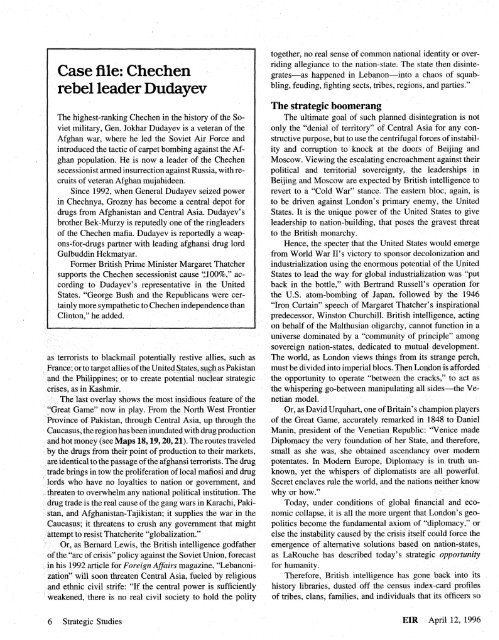Full Issue (PDF) - Executive Intelligence Review
Full Issue (PDF) - Executive Intelligence Review
Full Issue (PDF) - Executive Intelligence Review
Create successful ePaper yourself
Turn your PDF publications into a flip-book with our unique Google optimized e-Paper software.
Case file: Chechen<br />
rebel leader Dudayev<br />
The highest-ranking Chechen in the history of the Soviet<br />
military, Gen. Jokhar Dudayev is a veteran of the<br />
Afghan war, where he led the Soviet Air Force and<br />
introduced the tactic of carpet bombing against the Afghan<br />
population. He is now a leader of the Chechen<br />
secessionist armed insurrection against Russia, with recruits<br />
of veteran Afghan mujahideen.<br />
Since 1992, when General Dudayev seized power<br />
in Chechnya, Grozny has become a central depot for<br />
drugs from Afghanistan and Central Asia. Dudayev's<br />
brother Bek-Murzy is reputedly one of the ringleaders<br />
of the Chechen mafia. Dudayev is reportedly a weapons-for-drugs<br />
partner with leading afghansi drug lord<br />
Gulbuddin Hekmatyar.<br />
Former British Prime Minister Margaret Thatcher<br />
supports the Chechen secessionist cause "100%," according<br />
to Dudayev's representative in the United<br />
States. "George Bush and the Republicans were certainly<br />
more sympathetic to Chechen independence than<br />
Clinton," he added.<br />
as terrorists to blackmail potentially restive allies, such as<br />
France; or to target allies of the United States, such as Pakistan<br />
and the Philippines; or to create potential nuclear strategic<br />
crises, as in Kashmir.<br />
The last overlay shows the most insidious feature of the<br />
"Great Game" now in play. From the North West Frontier<br />
Province of Pakistan, through Central Asia, up through the<br />
Caucasus, the region has been inundated with drug production<br />
and hot money (see Maps 18,19,20,21). The routes traveled<br />
by the drugs from their point of production to their markets,<br />
are identical to the passage of the afghansi terrorists. The drug<br />
trade brings in tow the proliferation of local mafiosi and drug<br />
lords who have no loyalties to nation or government, and<br />
threaten to overwhelm any national political institution. The<br />
drug trade is the real cause of the gang wars in Karachi, Pakistan,<br />
and Afghanistan-Tajikistan; it supplies the war in the<br />
Caucasus; it threatens to crush any government that might<br />
attempt to resist Thatcherite "globalization."<br />
Or, as Bernard Lewis, the British intelligence godfather<br />
of the "arc of crisis" policy against the Soviet Union, forecast<br />
in his 1992 article for Foreign Affairs magazine, "Lebanonization"<br />
will soon threaten Central Asia, fueled by religious<br />
and ethnic civil strife: "If the central power is sufficiently<br />
weakened, there is no real civil society to hold the polity<br />
together, no real sense of common national identity or overriding<br />
allegiance to the nation-state. The state then disintegrates—as<br />
happened in Lebanon—into a chaos of squabbling,<br />
feuding, fighting sects, tribes, regions, and parties."<br />
The strategic boomerang<br />
The ultimate goal of such planned disintegration is not<br />
only the "denial of territory" of Central Asia for any constructive<br />
purpose, but to use the centrifugal forces of instability<br />
and corruption to knock at the doors of Beijing and<br />
Moscow. Viewing the escalating encroachment against their<br />
political and territorial sovereignty, the leaderships in<br />
Beijing and Moscow are expected by British intelligence to<br />
revert to a "Cold War" stance. The eastern bloc, again, is<br />
to be driven against London's primary enemy, the United<br />
States. It is the unique power of the United States to give<br />
leadership to nation-building, that poses the gravest threat<br />
to the British monarchy.<br />
Hence, the specter that the United States would emerge<br />
from World War II's victory to sponsor decolonization and<br />
industrialization using the enormous potential of the United<br />
States to lead the way for global industrialization was "put<br />
back in the bottle," with Bertrand Russell's operation for<br />
the U.S. atom-bombing of Japan, followed by the 1946<br />
"Iron Curtain" speech of Margaret Thatcher's inspirational<br />
predecessor, Winston Churchill. British intelligence, acting<br />
on behalf of the Malthusian oligarchy, cannot function in a<br />
universe dominated by a "community of principle" among<br />
sovereign nation-states, dedicated to mutual development.<br />
The world, as London views things from its strange perch,<br />
must be divided into imperial blocs. Then London is afforded<br />
the opportunity to operate "between the cracks," to act as<br />
the whispering go-between manipulating all sides—the Venetian<br />
model.<br />
Or, as David Urquhart, one of Britain's champion players<br />
of the Great Game, accurately remarked in 1848 to Daniel<br />
Manin, president of the Venetian Republic: "Venice made<br />
Diplomacy the very foundation of her State, and therefore,<br />
small as she was, she obtained ascendancy over modem<br />
potentates. In Modem Europe, Diplomacy is in truth unknown,<br />
yet the whispers of diplomatists are all powerful.<br />
Secret enclaves mie the world, and the nations neither know<br />
why or how."<br />
Today, under conditions of global financial and economic<br />
collapse, it is all the more urgent that London's geopolitics<br />
become the fundamental axiom of "diplomacy," or<br />
else the instability caused by the crisis itself could force the<br />
emergence of alternative solutions based on nation-states,<br />
as LaRouche has described today's strategic opportunity<br />
for humanity.<br />
Therefore, British intelligence has gone back into its<br />
history libraries, dusted off the census index-card profiles<br />
of tribes, clans, families, and individuals that its officers so<br />
6 Strategic Studies EIR April 12, 1996

















